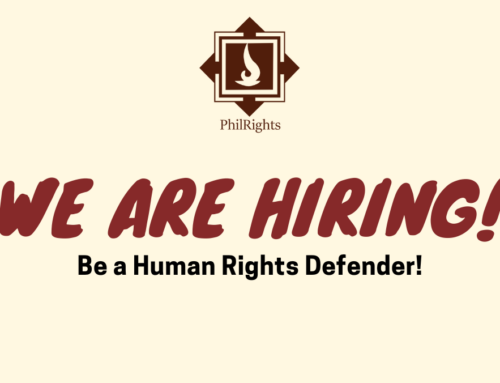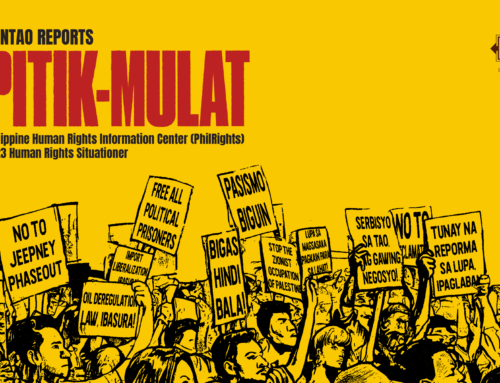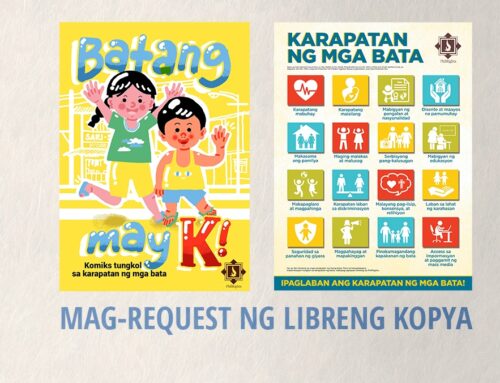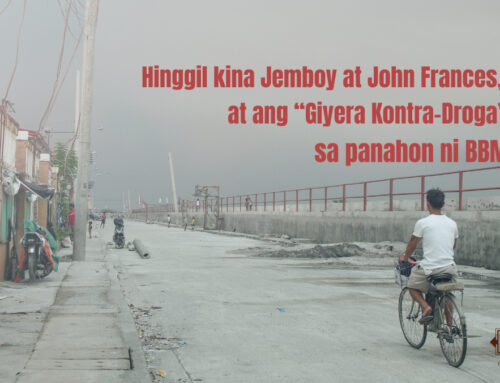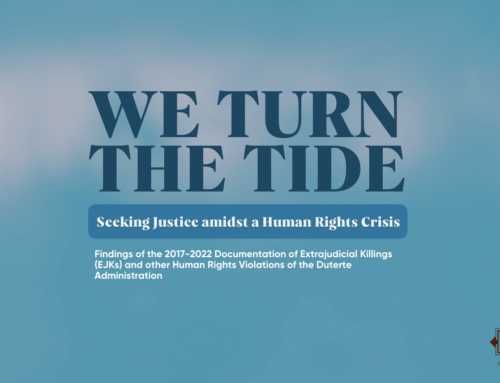by PhilRights Staff
As we mark June 26 as the International Day Against Drug Abuse and Illicit Trafficking, it is important to address the misconceptions that much of the public holds about illegal drugs and the people who use them.
This is not an endorsement of drug use; rather, we believe that moving the conversation towards nuanced, compassionate, and evidence-based discussions will only ensure that the public will support rights-based solutions to the country’s illegal drugs problem.
Without further ado, here are four misconceptions about drug use.
Drug use leads to a life of crime
Not necessarily. Addiction does not necessarily lead to criminal behavior. Indeed, this misconception is a problem of correlation versus causation. Just because there are some persons who use drugs who are also accused of committing a crime does not mean that all persons who use drugs will have a tendency to commit a crime.
To be sure, there are some crimes that are specific to drug use such as driving under the influence, but these are more emblematic of problematic use rather than regular use and can be committed even with legal drugs such as alcohol or prescription medication.
Drug use will lead to addiction
Not necessarily. Usage does not mean addiction. Drug use is done in a context and should be situated in such especially when performing an intervention. Drugs can be used for pleasure or recreation not unlike having a smoke or a drink with friends or alone after a long week. Other drugs can have a functional use, especially if these are stimulants. Some drugs are also medicinal or therapeutic, whether prescribed or self-medicated such as cannabis tea. Finally, drugs can also be used as a coping mechanism to deal with stress or particular hardships.
Some people can use illegal drugs recreationally or functionally without becoming addicted or the use becoming problematic. The World Drug Report 2015 notes that up to 90% of illicit drug use is not problematic. Problematic use starts when the it results in some form of harm rather than how much or how often the drug is used.
Additionally, the use of illegal drugs is not the only way of getting an addiction or a substance abuse problem. Problematic use, substance abuse, or addiction can also happen with prescription drugs, alcohol, cigarettes, or even coffee. Just because some substances are legal while others are not does not mean that these are safer or that we should be complacent with them.
Finally, any person suffering from any form of substance abuse is not defined by the use of drugs or any other substance. What is also likely is that the substance abuse is a symptom rather than the disease and as such an intervention fixated on the substance may miss the underlying cause of the person’s problem. Addressing the root cause of the problem—be it grief, unemployment, poverty, or clinical disorders—would be more effective in the long run.
Suppressing the supply of illegal drugs will significantly reduce demand for it
False. Economically speaking, the demand of illegal drugs by users is inelastic. This means that the demand for illegal drugs is usually stable or constant. Because the demand for illegal drugs will always be high, the suppression of the supply side will not lead to fewer users but rather higher black market prices. The higher black market price from initial supply repression actually leads to new sellers of illegal drugs that will capitalize on the higher prices and low supply.
Prohibition is the way to treat illegal drugs
Real life policy implementation suggests otherwise. The outright prohibition of illegal drugs and the securitization of illegal drugs has only resulted in death and destruction in Mexico, Colombia, the Philippines, and more recently in Bangladesh. The leaders of these countries successfully securitized the issue of drug use, meaning that they framed drug use as an existential threat in order to justify extraordinary—and murderous—efforts to combat it. The result has only been bloodshed and the dehumanization of persons suffering from substance abuse.
And these campaigns have proven ineffective. As it has in Mexico, a crackdown on the supply may even result in more violence as new groups fight for control over the drug trade amid power vacuums and price hikes.
Potential patients suffering from substance abuse would also suffer under harsh prohibition as they would have a harder time accessing possible interventions. Some proven substance abuse interventions such as methadone treatments would be outright banned—as it is in the Philippines.
Instead of prohibition, some countries have resorted to decriminalization. While pushing and selling drugs could still be illegal (as in the case of partial decriminalization), the owning and personal consumption of the substances would not be. An example is Portugal, now considered a world leader and best example for decriminalization of drug use. The Portuguese policy shifted the paradigm away from punishment to one of care and rehabilitation, allowing the country to save many lives and heavily suppress the transmission of AIDS.
These misconceptions and the alarmist narratives that endorse them and utilize them as justification for the dehumanization and killing of drug users – or even just suspected drug users – in the government’s bloody so-called “war on drugs” have eroded any possibility for long-term solutions that are rights-based and observe the principles of restorative justice.
We believe that combating illegal drugs should mean combating the root causes of substance abuse of all kinds and implementing rights-based interventions where needed. The illegal drugs problem should be treated as a health issue, not as a security issue: Persons suffering from substance abuse need a doctor, not a prison sentence.
—
Misconceptions adopted from the work of NoBox Philippines. For more information on Harm Reduction, visit their website.
More information videos:
3 Arguments Why Marijuana Should Stay Illegal Reviewed
Why The War on Drugs Is a Huge Failure
Further reading:
Just Say Know; Philippine Drug Education Manual, by NoBox Philippines ( )(2018)
Duterte’s “War on Drugs;” The Securitization of Illegal Drugs and the Return of National Boss Rule by Nathan Gilbert Quimpo. From A Duterte Reader: Critical Essays On Rodrigo Duterte’s Early Presidency (2017)
Portugal’s radical drugs policy is working. Why hasn’t the world copied it? (2017)
War on Drugs: Portugal may be winning the battle against drug abuse through decriminalisation (2017)
A Public Health Approach to Drug Use in Asia: Principles and Practices for Decriminalization (2016)
World Drug Report 2015, United Nations Office on Drugs and Crime
Ending the Drug Wars; Report of the LSE Expert Group on the Economics of Drug Policy (2014)
Recalibrating the Regime; The Need for a Human Rights-Based Approach to International Drug Policy (2008)
The War on (Certain) Drugs, by Noam Chomsky (1993)




